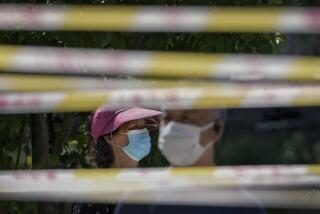Chinese Health Officials Report New Suspected SARS Case
- Share via
BEIJING — China reported a new suspected case of SARS on Sunday, as health officials in southern China continued working to identify the source of a new outbreak of the respiratory disease that caused a worldwide health alert last year.
The new suspected victim is a 35-year-old man, said Dr. Thomas Tsang, a spokesman for the Hong Kong Department of Health. But unlike the country’s other current suspected case, involving a 20-year-old waitress who works in a restaurant that serves wild game, the man does not work with animals believed to be a possible source of the infection, officials said.
Both patients have been isolated and hospitalized pending tests to determine whether they suffer from severe acute respiratory syndrome.
The World Health Organization, however, said it is still waiting for official confirmation from the Chinese Health Ministry regarding the second suspected case. WHO officials said they knew of no link between the two patients and China’s first confirmed SARS case this winter, a 32-year-old television producer named Luo. He has reportedly recovered and been discharged from the hospital.
“At this point there’s no significant public health threat,” WHO spokesman Roy Wadia said by phone from Guangdong province, where the new case was reported. “We’ve seen so far one confirmed case, one suspected case, the waitress. Even if this man is confirmed to be another suspected case, it would still be three cases out of a huge population area.”
The new suspected victim emerged as health officials in southern China searched for the source of the outbreak, looking at the restaurant where the waitress worked and poking around markets that sell wild animals.
They have been scouring the apartment block where Luo lived, taking samples from the water system, garbage and stairwells, and are reported to have trapped 37 rats. Luo had apparently been in contact with rats in his building before falling ill. So far, the tests on the rodents are inconclusive, Wadia said.
While Luo told officials he had no contact with any wild animals suspected of carrying the virus, Chinese authorities were continuing a massive campaign to exterminate civet cats, a weasel-like animal favored in southern Chinese cuisine. Tests have shown civet cats carry the SARS virus, but there is no definitive proof that they transmitted the disease to humans.
Meanwhile, local officials have also begun setting poison traps for rats, fearing it’s possible that the rodents could spread the virus through trash and sewage systems.
While two suspected SARS cases might seem insignificant in a country of 1.3 billion people, last year’s outbreak was a powerful reminder of a disease’s potential to inflict massive harm on a country’s economy and public image. Businesses shuttered, and travel and tourism ground to a halt.
Beijing made a bad situation worse when it initially covered up the early cases of SARS, denying they existed and allowing the illness to spread. A new optimism emerged as officials realized that a large-scale public health disaster could be avoided only by being open.
Some observers, however, are now worried that the lessons from last year may not have sunk in.
While most TV stations and newspapers are now carrying updates about the latest SARS developments, there is growing concern that a crackdown is in the works to rein in publications considered to be going too far. Police last week charged into the office of a newspaper in Guangdong that has been aggressive in investigating the new SARS outbreak.
In the raid, authorities detained top editors at the Southern Metropolitan Daily, allegedly on suspicion of financial crimes. Critics believe the raid was an attempt to silence the paper’s SARS reporting.
More to Read
Sign up for Essential California
The most important California stories and recommendations in your inbox every morning.
You may occasionally receive promotional content from the Los Angeles Times.













